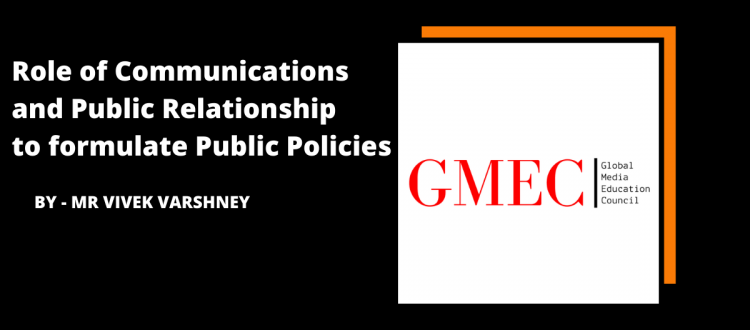Role of Communications and Public Relationship to formulate Public Policies
First, let me begin by highlighting that broadcasting in its broader view means the transmission of information and viewpoint from one side to the other through any and every possible means or tool of broadcasting.
Similarly, public relations in the context of state and government my relationship with the public in the relevant territorial jurisdiction from the block, taluka, subdivision to the district to state which may include the haves and the have nots, the weaker sections, the urban and rural populace inhabiting or residing in a territory.
When I joined the Civil Service it used to be said that we are government servants but as we all know ours is a welfare state where the government has to provide all essential services to the public and so in course of time the emphasis changed from being a government servant to being a public servant.
A public servant is bound by all India service rules and one of the rules states no member of the service shall in any radio broadcast or communication or any public media or in any document published or in any communication to the Press or in any public utterance make any statement of fact or opinion which is critical of the government in public.
Thus this rule essentially bars officers from expressing views critical of the government in public, even if only to state a fact.
The old school conventions are based on the doctrine of anonymity where an officer neither praises nor criticizes the government.
Social media however has changed these dynamics. However, it is being observed of late that while an officer is not allowed to criticize the government they can provide positive suggestions indicating what is good for the country. Even the rules as they are structured don`t prohibit an officer from giving ideas that are good for the nation and the national interest.
While we cannot talk, nothing stops us from officially disagreeing with certain things. If one puts things on the file it will be overcome on the file. This is the way of registering protest.
Being sworn under the constitution it becomes our duty to not accept something blatantly unconstitutional.
So as of now the balance between speaking in public and being bound by existing rules is very thin. With this as a background, I will now proceed further. The Government of a welfare state is not a company or an industry or a university or an NGO it encompasses them all. While by ensuring free education and free ration, on one hand, it is also responsible for providing and promoting the health of the public and building schools, hospitals on one hand and constructing infrastructure projects, on the other hand, to bring qualitative improvements in the life of its citizens.
All the policies of the government for public welfare will only be fruitful if it is able to convey them to the public at large. That is possible only through effective communication with the public. This is done with the help of different channels of communication. Thus Public Relations is all about communicating effectively with the public to attract public attention, win their belief, achieve understanding and earn their goodwill.
There are various PR tools used to communicate to the public:-
Oral communication, printed and graphic communication, print media, outdoor media, broadcast media and other media like websites. Thus all these PR tools have an important role to play in development – as a widespread tool of information transfer and as a method to improve governance.
They all lead to the participation of the community in ownership as well as programming, management, operations, financing and evaluation of the government programs. They are the means by which development-oriented messages are communicated to the public that needs them most.
A public servant passes through various stages during his tenure from serving in the field at the junior level to formulating policies at the senior level.
While in the field he has implemented the policies of the government in an equitable and transparent manner. The public does feel satisfied which sends a good message. Thus directly or indirectly and consciously or unconsciously this Public Relationship experience generated at the field, the level will stand in the good stead for the officer when he reaches the policy formulating stage in the government.
That is why the Government of the day, irrespective of their political leanings, do insist that all officers, in a responsible position, must meet the public daily to redress their grievances. This is a very effective and positive way to form Public Relations which not only helps to spread the policies of the government but also helps to gauge public opinion.
The development schemes work well when there is peace and calm in the state. So let me tell you the DM is not only responsible for ensuring development projects in his district he is also the criminal head of Administration and here too the spread of government policies and his Public Relations helps to maintain law and order in the district.
A problem may flare up on the slightest pretext and apart from rushing the forces to the scene of the incident the situation has to be brought under control through the proper broadcast of the administration’s viewpoint and using the relationship with public to quell rumours by holding peace committee meetings to clear the air of distrust among warring communities.
So in the administration, there are no foreseen or forgiven situations. Likewise, the reaction of the government machinery also varies from situation to situation. The use of means of Communications and Public relationships helps to formulate public policies which are put into practice to ensure that the benefits of development reach the last strata of the society.

